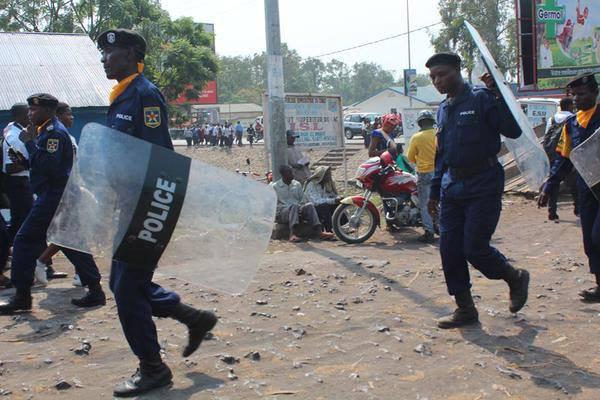UN human rights office urges probe into excessive use of force in DR Congo protests
The Office of the UN High Commissioner for Human Rights (OHCHR) expressed alarm at the apparent excessive use of force by security officers against demonstrators in Democratic Republic of the Congo cities Kinshasa and Goma, and called for “a thorough and independent investigation” into the matter on January 23.

Police officers trying to maintain calm during demonstrations in Kinshasa, capital of the Democratic Republic of the Congo.
“We urge the Government to promptly conduct a thorough and independent investigation into any excessive use of force by law enforcement officials – and in particular the reported use of live ammunition against protestors,” OHCHR spokesperson Rupert Colville told reporters in Geneva on January 23.
“Any use of force during demonstrations must be exceptional and, when used, must be proportional and strictly necessary,” Mr. Colville said. “The intentional lethal use of firearms may only be made when strictly unavoidable in order to protect life.”
“We also call on the protestors to refrain from any acts of violence or vandalism,” he said.
Also on January 23, the team of International Envoys for the Great Lakes Region of Africa expressed their deep concern about recent violence in the Democratic Republic of the Congo (DRC), where more than 13 people have reportedly been killed and more than 30 injured in the context of several days of anti-Government demonstrations in the capital Kinshasa, and Goma in the eastern part of the country.
The protests, which began on 19 January against the passing of an electoral bill in the lower house of the legislature, had also resulted in the detention of more than 300 individuals across the Democratic Republic of the Congo including prominent members of the opposition and civil society representatives,” Mr. Colville said.
“The electoral bill is now before the Senate and there are fears that its passage may escalate the situation and result in more violence,” he warned.
The team of envoys called on the DRC Government to exercise restraint, condemned any use of force against peaceful, unarmed demonstrators and arbitrary arrests, and noted that all citizens, including demonstrators and their leaders, have a responsibility to pursue political objectives by non-violent means in conformity with relevant national laws.
They also encouraged the Government, the opposition, as well as civil society to avail themselves of the good offices of the UN in facilitating an inclusive and transparent dialogue between all stakeholders as per provisions of relevant Security Council resolutions.
The team of envoys are comprised of: UN Special Envoy for the Great Lakes Said Djinnit; UN Special Representative for the DRC Martin Kobler; African Union Special Representative for the Great Lakes Boubacar Diarra; European Union Senior Coordinator for the Great Lakes Koen Vervaeke; United States’ Special l Envoy for the Great Lakes and the DRC Russell D. Feingold; and Belgium’s Special Envoy for the Great Lakes Frank de Coninck.
The OHCHR also said that State authorities have restricted Internet and mobile text messaging services for more than three days now, not only disrupting communication between individuals but also creating disruption in the conduct of economic activities, like banking.
“We also call on the authorities to promptly release all those who have been detained for exercising their right to peaceful assembly, for expression of their views, for their affiliation with the opposition or for disagreeing with the amendments to the electoral bill,” Mr. Colville said.
“The right to vote in genuine, periodic elections is a fundamental human right enshrined in the Universal Declaration on Human Rights and International Covenant on Civil and Political rights,” he added.
UN Secretary General Ban Ki-moon urged maximum restraint on all sides and flagged the readiness of his Special Representative in the DRC, Martin Kobler, to use his good offices to help narrow the gap between the main actors involved on January 22.
Mr. Kobler later tweeted that “the freedom of opinion is the basic pillar of democracy. It has to be guaranteed while at the same time handled with responsibility.”
Source: United Nations
- 371 reads
Human Rights
Fostering a More Humane World: The 28th Eurasian Economic Summi

Conscience, Hope, and Action: Keys to Global Peace and Sustainability

Ringing FOWPAL’s Peace Bell for the World:Nobel Peace Prize Laureates’ Visions and Actions

Protecting the World’s Cultural Diversity for a Sustainable Future

Puppet Show I International Friendship Day 2020

